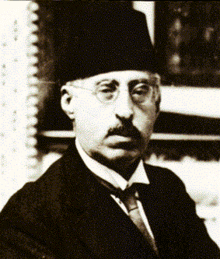Shakib Arslan
| Shakib Arslan | |
|---|---|
 | |
| Born |
25 December 1869 Choueifat (near Beirut) |
| Died | 9 December 1946 (aged 76) |
| Nationality | Lebanese |
| Occupation |
|
| Religion | Druze |
| Children | May Arslan |
| Relatives |
Emir Majid Arslan II Emir Talal Arslan Walid Jumblatt (grandson) |
Shakib Arslan (Arabic: شكيب أرسلان, 25 December 1869 – 9 December 1946) was a Druze prince (amir) from Lebanon who was known as Amir al-Bayān (Arabic for "Prince of Eloquence") because in addition to being a politician, he was also an influential writer, poet and historian.
Influenced by the ideas of al-Afghani and Muhammad Abduh, Arslan became a strong supporter of the Pan-Islamic policies of Abdul Hamid II. He also advocated the proposition that the survival of the Ottoman Empire was the only guarantee against the division of the ummah and its occupation by the European imperial powers. To Arslan, Ottomanism and Islam were closely bound together and the reform of Islam would naturally lead to the revival of the Ottoman Empire.
Exiled from his homeland by the French Mandate authorities, Arslan passed most of the interwar years in Geneva serving as the unofficial representative of Syria and Palestine at the League of Nations and writing a constant stream of articles for the periodical press of the Arab countries.

Advocacy
Amir Shakib advocated a version of Islam that was charged with political and moral assertiveness. He sought to reconstruct the bonds of Islamic solidarity by reminding Muslims from Morocco to Iraq that despite their diversity, they were united by virtue of their common adherence to Islam; if they would but recognize this bond and act on it, he believed they would achieve liberation from their current oppression and the restoration of what he saw as their splendid past. Arslan's work inspired anti-imperialistic propaganda campaigns, much to the irritation of British and French authorities in the Arab world.
He defended Islam as an essential component of social morality. His message, with its call to action and its defense of traditional values at a time of great uncertainty, was well received and attracted widespread attention during the 1920s and 1930s. It was during this time that he wrote his most famous work, Our Decline: Its Causes and Remedies, which described what Aslan believed to be the reasons for the weakness of existing Muslim governments.
Family
His daughter, May, married Lebanese Druze politician Kamal Jumblatt and he is the grandfather through her of Lebanese politician Walid Jumblatt.
Works
- Our Decline: Its Causes and Remedies (English translation published by Islamic Book Trust in 2004; ISBN 9839154540)
Further reading
- Islam Against the West: Shakib Arslan and the Campaign for Islamic Nationalism by William L. Cleveland (University of Texas Press, 2011; ISBN 0292737335)
- Muslime im Zwischenkriegseuropa und die Dekonstruktion der Faszination vom Westen. Eine kritische Auseinandersetzung mit Šakīb ʾArslāns Artikeln in der ägyptischen Zeitschrift al-Fatḥ (1926-1935) by Mehdi Sajid (EB-Verlag, 2015; ISBN 978-3-86893-185-3)
External links
| Arabic Wikisource has original text related to this article: |
- Emir Shakib Arslan biography by Hassan Shami at Aide Sanitaire Suisse Aux Palestiniens
- The Arab Nation of Shakib Arslan, a review of Islam Against the West, by Martin Kramer
- Swiss Exile: The European Muslim Congress, 1935 (an event organized by Arslan), a chapter from Islam Assembled: The Advent of the Muslim Congresses (New York: Columbia University Press, 1986) by Martin Kramer
See also
- List of political families
- Emir Majid Arslan II
- Prince Talal Arslan
- Princess Zeina Talal Arslan
- Prince Majid Talal Arslan
- Lakhmids
|